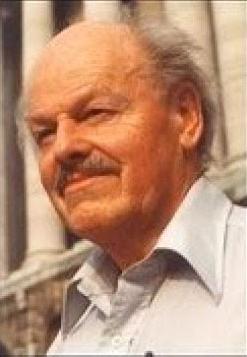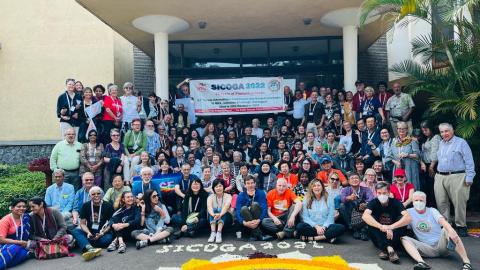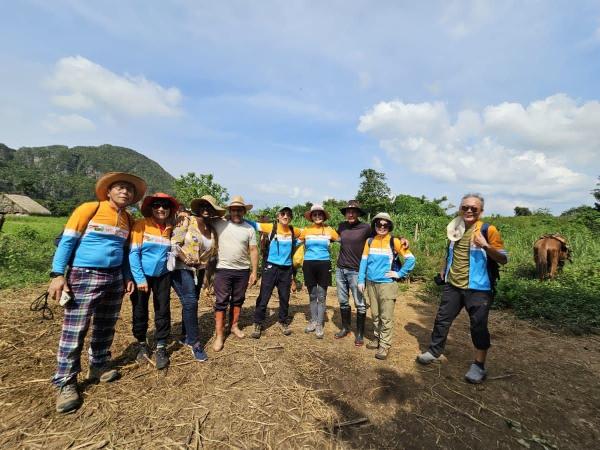"The Seeds of Servas"
The idea of Servas grew from a group of people of different nationalities who started a movement called Peace Builders at the end of the 1940s. The members of the group were deeply touched by the devastation caused by World War II and wanted to make a contribution to build a more peaceful world.
“With the aim of working actively for peace and social justice, with other peace movements, they came up with the idea of a work-study-travel system that made it possible for people of various nations to travel in a more thoughtful way, by visiting the homes of hosts offering hospitality”, Bob Luitweiler writes in his book The Seeds of Servas. He was one of the founders of Peace Builders and someone who made a major contribution to the growth of the network.

Bob Luitweiler, one of the founders of Servas and the author of The Seeds of Servas
The work-study-travel system was focused on getting to know courageous people, often working against serious odds, who were building a better world by starting with vital projects in their own local communities. The Peace Builders wanted to help open-minded people experience these oases of sanity and generosity and apply some of what they had learned when they returned home.
Though not pacifists, Servas has from the start aimed to build the foundations of justice that can lead to a peaceful world
Bob Luitweiler, in The Seeds of Servas
From the network set up to achieve the aims of the work-study travel system, Servas developed to reach out to people who shared the same goals and who were ready to offer free hospitality for like-minded people. Within a few years the movement had taken root in a number of countries, with people willing to open their doors to others travelling within the network.
“Though not pacifists, Servas has, from the start, aimed to build the foundations of justice that can lead to a peaceful world”, Bob Luitweiler writes in his book.
At the first Peace Builders International Conference in Hamburg, Germany, in 1952, the network and program was renamed Servas, which means "serve," in the international language Esperanto. The conference delegates agreed the wanted a name that was more international than the suggested English names Peace Builders or Open Doors.
At the conference in Germany, England, Denmark and Germany were officially represented. “The thought was that people who travelled would learn from their hosts how they could more effectively serve in their home communities to develop programs and human relations that were free of the seeds of war. At no time did anyone suggest that choosing Servas meant we would abandon our original purpose of peace building,” Bob Lutweiler writes in The Seeds of Servas.

1972, Servas adopts its Charter
Twenty years later, all Servas National Secretaries present at an international Servas conference in Wetzlar, Germany, in July 1972, adopted and signed the document Statutes of Servas International (Corporation Charter).
The charter was a legal framework for Servas International’s financial and administrative requirements. At the conference in Wetzlar a number of people were elected to fill the offices of the international corporation and to carry out Servas International responsibilities.
Over the years the statutes that were adopted in 1972 have been continuously modernised. The current statutes were amended and adopted at the Servas International General Assembly 2024.
1973, recognition at the United Nations
Since 1973, Servas International has consultative status as an international non-governmental organisation, iNGO, with the Economic and Social Council (ECOSOC) at the United Nations. The consultative status makes it possible for our organisation to be active at the United Nations premises in New York City in the USA, Geneva in Switzerland, and Vienna in Austria.
Video interviews with Bob Luitweiler
You can watch some video interviews with Bob Luitweiler, for many years the central figure in Servas. The videos were produced by Seishiro Tomioka and directed by Jay Tomioka / Servas Japan.
Keys to SERVAS, the beginning
SERVAS - A light in the dark, Part 1
SERVAS - A light in the dark, Part 2
Vagabond College
Read Bob Luitweiler's own story about the early days of Servas in The Seeds of Servas (PDF)
The Seeds of Servas is translated to Portuguese: As Sementes de Servas (PDF)
The Seeds of Servas is translated to Turkish: Servas'ın Tohumları (PDF)
The Seeds of Servas is translated to Dutch: De Zaden van Servas (PDF)
The Seeds of Servas is translated to Italian: I Semi di Servas (PDF)
The Seeds of Servas is translated to Spanish: Las Semillas de Servas (PDF)
See also
Join & support
Articles you might be interested in
VISIT SICOGA WITH YOUR EARS & EYES
2019-03-30